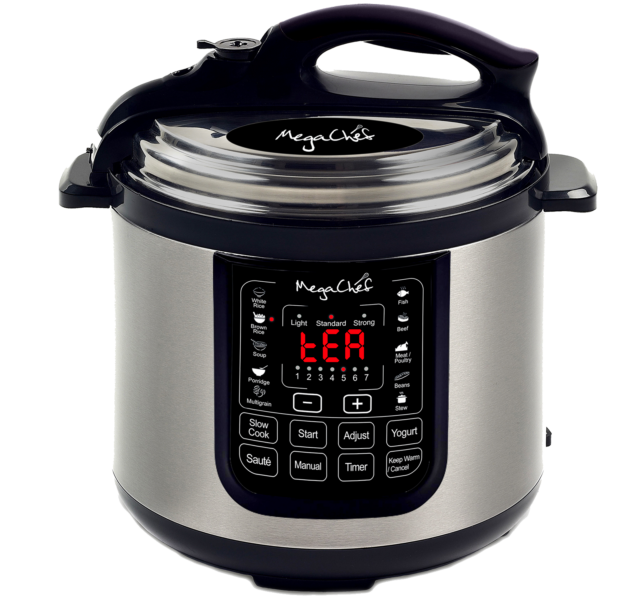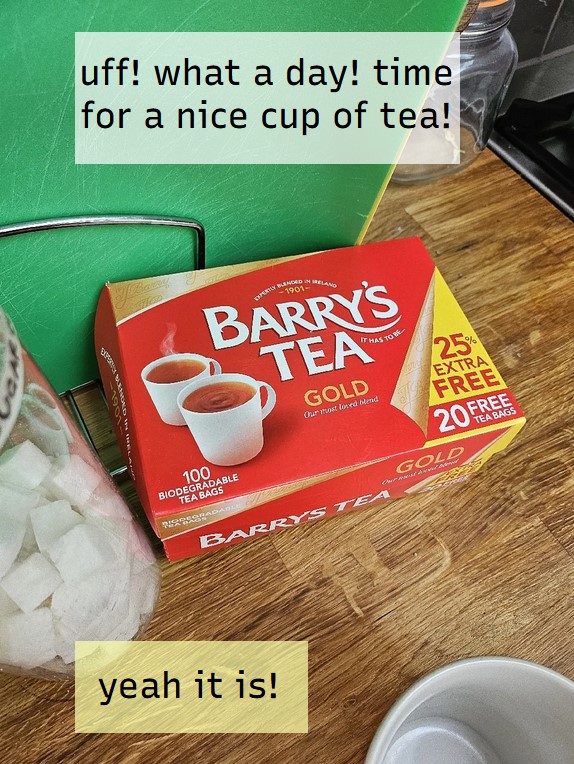I’m not a tea-drinker1. But while making a cuppa for Ruth this morning, a thought occurred to me and I can’t for a moment believe that I’m the first person to think of it:
What about a pressure-cooker, but for tea?2
Hear me out.

It’s been stressed how important it is that the water used to brew the tea is 100℃, or close to it possible. That’s the boiling point of water at sea level, so you can’t really boil your kettle hotter than that or else the water runs away to pursue a new life as a cloud.
That temperature is needed to extract the flavours, apparently3. And that’s why you can’t get a good cup of tea at high altitudes, I’m told: by the time you’re 3000 metres above sea level, water boils at around 90℃ and most British people wilt at their inability to make a decent cuppa4.
It’s a question of pressure, right? Increase the pressure, and you increase the boiling point, allowing water to reach a higher temperature before it stops being a liquid and starts being a gas. Sooo… let’s invent something!
I’m thinking a container about the size of a medium-sized Thermos flask or a large keep-cup – you need thick walls to hold pressure, obviously – with a safety valve and a heating element, like a tiny version of a modern pressure cooker. The top half acts as the lid, and contains a compartment into which you put your teabag or loose leaves (optionally in an infuser). After being configured from the front panel, the water gets heated to a specified temperature – which can be above the ambient boiling point of water owing to the pressurisation – at which point the tea is released from the upper half. The temperature is maintained for a specified amount of time and then the user is notified so they can release the pressure, open the top, lift out the inner cup, remove the teabag, and enjoy their beverage.
This isn’t just about filling the niche market of “dissatisfied high-altitude tea drinkers”. Such a device would also be suitable for other folks who want a controlled tea experience. You could have it run on a timer and make you tea at a particular time, like a teasmade. You can set the temperature lower for a controlled brew of e.g. green tea at 70℃. But there’s one other question that a device like this might have the capacity to answer:
What is the ideal temperature for making black tea?
We’re told that it’s 100℃, but that’s probably an assumption based on the fact that that’s as hot as your kettle can get water to go, on account of physics. But if tea is bad when it’s brewed at 90℃ and good when it’s brewed at 100℃… maybe it’s even better when it’s brewed at 110℃!
A modern pressure cooker can easily maintain a liquid water temperature of 120℃, enabling excellent extraction of flavour into water (this is why a pressure cooker makes such excellent stock).

I’m not the person to answer this question, because, as I said: I’m not a tea drinker. But surely somebody’s tried this5? It shouldn’t be too hard to retrofit a pressure cooker lid with a sealed compartment that releases, even if it’s just on a timer, to deposit some tea into some superheated water?
Because maybe, just maybe, superheated water makes better tea. And if so, there’s a possible market for my proposed device.
Footnotes
1 I probably ought to be careful confessing to that or they’ll strip my British citizenship.
2 Don’t worry, I know better than to suggest air-frying a cup of ta. What kind of nutter would do that?
3 Again, please not that I’m not a tea-drinker so I’m not really qualified to comment on the flavour of tea at all, let alone tea that’s been brewed at too-low a temperature.
4 Some high-altitude tea drinkers swear by switching from black tea to green tea, white tea, or oolong, which apparently release their aromatics at lower temperatures. But it feels like science, not compromise, ought to be the solution to this problem.
5 I can’t find the person who’s already tried this, if they exist, but maybe they’re out there somewhere?

